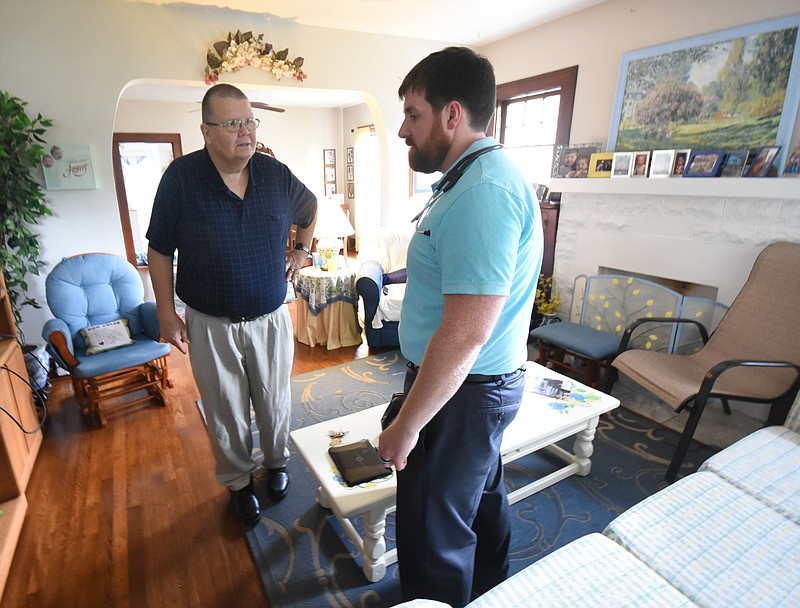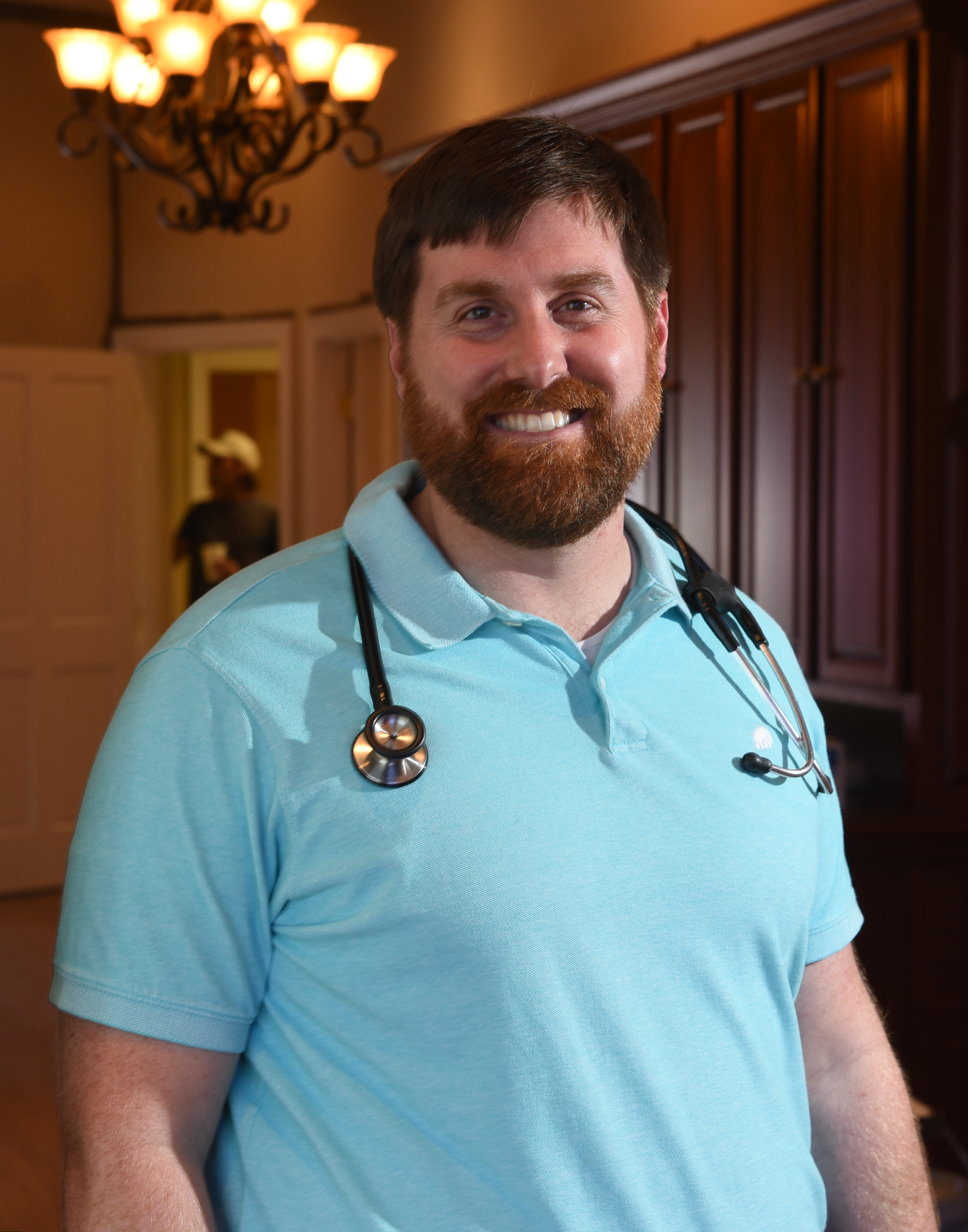More Info
Hitchcock Family Medicine monthly fee schedule:• Ages 18-45: $55• Ages 46-65: $75• Ages 65 and up: $100• Children of members ages 2-18: $10
More Info
Conditions diagnosed at the EPB Employee Health Center over past eight years:• 546 cases of hypertension• 396 employees with high cholesterol• 203 with diabetes• 20 men with high numbers for prostate specific antigen, a possible indicator of prostate cancer
Dr. Matthew Hitchcock makes house calls.
Yes, you read that right.
He visits his patients at home, toting his medical equipment in a classic, black, pebble-grained leather doctor's satchel.
"Doing house calls has been so much fun. The patients have loved it, too," says Hitchcock, a native of Dunlap, Tennessee who recently finished a stint as a Navy doctor and just launched a practice in Hixson.
Hitchcock is a local example of what's old becoming new again in medicine.
His traditional style of cash-only family doctoring - called "direct primary care" these days - has become more popular, even as the Affordable Care Act, or Obamacare, mandates that every American must have health insurance.
Hitchcock is one of at least four Chattanooga doctors who prefer cash to dealing with health insurance companies.
Hitchcock plans to get 500 patients who'll pay a monthly fee of $55 to $100, which he says will give him twice the earnings of a typical family practice doctor with a quarter of the patient load. That, he says, will make life better for him and allow him more time with patients.
Meanwhile, the company doctor also is making a comeback. At the Roper Corp. stove-manufacturing plant in LaFayette, Georgia, for instance, there's no charge for employees who are on Roper's health insurance plan to use a plant clinic that's staffed with a doctor, nurses and equipped with a small pharmacy.
"There's tons of [company] clinics in Chattanooga," said health care consultant Ed Adams of EBS Consulting in Chattanooga.
For the past decade, Adams has helped businesses and organizations set up on-site health clinics, including at Collegedale-based McKee Foods, the maker of Little Debbie snack cakes.
"It's a growing thing," he says. "A lot more companies are considering it."
Although more Americans have insurance under Obamacare, many pay more out of pocket for it.
That's partly because of the rising cost for many workers of their health insurance deductibles, or the amount employees pay out-of-pocket before insurance kicks in. High deductibles could be an incentive for people to sign up with a cash-only doctor, Adams said.
"If you have a high deductible, $5,000 or so, that might appeal to you," he says.
'Like a gym membership'
Hitchcock Family Medicine, which is due to open this month in a former bank building on Hixson Pike, will charge its 500 patients a flat, monthly fee based on their age.
"They pay me a direct fee, a lot like a gym membership," says Hixson, a bearded, 34-year-old father of three whose wife, a nurse, will pitch in as needed at the office.
"Businesses can sign up with me," he adds. "The business can pay a percentage of my fee, 0 to 100 percent. This can be a great way for a small business to offer something for their employees."
Hitchcock will get to do the kind of doctoring that he wants to, including house calls and hour-long patient visits - without having what he describes as the hassle and expensive overhead needed to deal with what Hitchcock calls "the insurance hamster wheel."
"If you need to come in and see my ever single day, you can come in and see me every day," he said.
Hitchcock doesn't have the crushing medical school debt that some doctors do, thanks to his service as a Navy doctor.
"The Navy paid for everything," says Hitchcock, who attended the University of Tennessee's College of Medicine in Memphis. Before that, he did his undergraduate studies at Clemson University and completed high school at The McCallie School, a private, college prep school in Chattanooga.
He plans to run a low-overhead, one-man operation. He's not even hiring a receptionist. He'll answer all the phone calls himself.
"The key to his whole model is just keeping your overhead as low as you can," Hitchcock says.
Aside from a refurbished, classic, 1930s-era examination table, Hitchcock won't have much equipment. Instead of having his own an X-ray machine or lab, he's outsourced those services to an area medical imaging business and with the local medical laboratory with the national company, Quest Diagnostics, Inc.
"Pennies on the dollar," is how Hitchcock describes the flat, up-front fee he'll pay for such lab tests as a thyroid panel, which will cost him $8, compared to the normal $140.
Hitchcock bought the building on Hixson Pike that he renovated into his doctor's office.
"The mortgage payment was about half what I was looking at for rent around the county," he says.
He's styling his practice after Atlas M.D., in Wichita, Kansas, a successful practice with a handful of doctors that's become a model for others to follow.
"I'm literally using their business model directly," Hitchcock says.
Hitchcock thinks more family doctors will try direct primary care.
"I hope so," he says, since doctors starting out will opt for high-paying, lower-stress specialties such dermatology instead of going into family practice. About 70 percent of U.S. doctors are specialists, he said.
One obstacle Hitchcock faces is getting people to believe that the direct primary care model is possible.
"That's the first words out of everybody's mouth," he says. 'It's too good to be true.'"
'No cost to go' to company clinic
Both patients and employers come out ahead with a company clinic, Adams said, which usually open at companies with 500 or more employees and pays for itself within 18 months.
"You have the convenience of accessing it at work," Adams says. "You don't have to take a day off or wait two weeks for an appointment."
Roper Corporation has a health clinic on site staffed with a doctor, nurses and pharmacy. Employees and family members who pay the monthly premiums for the company's BlueCross BlueShield of Georgia health insurance get care free of charge.
"There really is no cost to go," plant spokesman Scott Reece says, "other than your premiums."
In 2011, Roper opened the clinic, which is operated by Redmond Hospital of Rome, Georgia, to save money. Roper is self-insured and hires BlueCross BlueShield of Georgia to administer its health insurance.
"Our health care costs were kind of getting out of control," Reece says. "We were looking for ways to cut costs."
The clinic saves money, Reece said, because Roper pays the Redmond hospital directly each month. That's less expensive than having to reimburse BlueCross BlueShield when patients use an off-site doctor, he said.
The clinic has proven popular with the Roper plant's roughly 1,750 employees.
Visits to the clinic this year total 13,316, Reece said, of which 2,121 were by spouses and children. Employees save an estimated $1,500 a year, Reece says, thanks to the clinic.
And that's a benefit that Roper touts when it hires workers, for the plant, which has starting pay for assembly line workers around $12 to $13 an hour.
"That's one of the things we do when we interview people," Reece says. "We tell them about our wellness center."
Screenings save companies money
Businesses also can save big by improving the health of their employees, Adams said, through screenings for diseases and risky conditions.
That's been the case for EPB, Chattanooga's publicly-owned electric, Internet and cable TV provider, which for the past eight years has offered free care for both its current and retired employees at an employee health center on McCallie Avenue headed by Dr. Glenn Beasley.
"It's been very successful," EPB spokesman John Pless says. "It really helps reduce overall health care costs."
Since it opened eight years ago, health screenings have detected more than 1,000 potentially life-threatening conditions, from hypertension to diabetes, according to the health center's most recent annual report released this summer. The health center has been used, Pless said, by 82 percent of EPB's employees.
"The whole bottom line of this is EPB fostered the culture of wellness," he says.
Roper gives discounts to employees who get screened for five things that can show health risks: body mass index, cholesterol, blood sugar, blood pressure and tobacco use.
There's a 50 percent discount on health insurance premiums for employees who test in the healthy range for three of the five screenings, Reece said. Employees who take the test get 25 percent off, regardless of how healthy they are. Roper employees who decline the health screenings pay 100 percent of their health premium.
"What we're trying to do is get people to pay attention to their health," Reece says.

